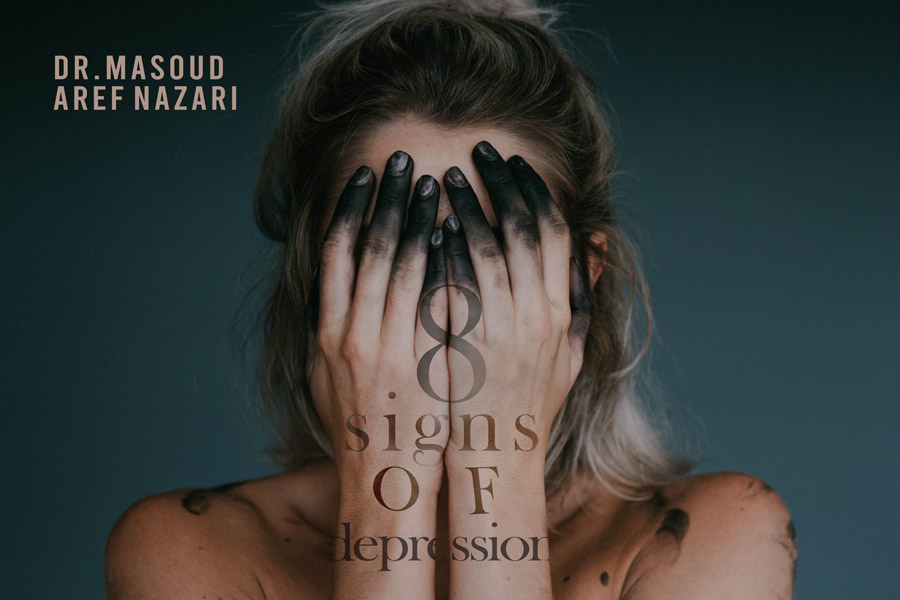Are you struggling with depression?
Eight signs of depression that needs more attention
Depression is sometimes referred to as the psychological flu because most people experience mood swings throughout their lives, which include periods of severe tiredness, extreme sadness, and disruption of daily life behaviors.
It should be noted that unhappiness or casual periods of sadness do not necessarily mean depression. Various events such as love failure, loss of a loved one, or job and professional failures can be accompanied by periods of mourning and unhappiness. In such cases, receiving professional help and proper management of such crises will prevent depression. There are eight Signs of depression explained along with some questions in each section. If your answer is positive to most of these questions you may consider consulting with professionals.
1. Lack of interest and pleasure
One of the main symptoms of depression is that people no longer enjoy the activities they usually enjoy. Socializing with friends, sports, parties, sightseeing will be difficult for them. Their sexual appetite may decrease, and they may be challenged in their relationships. They no longer enjoy work or study. A person who has a lower-than-usual and unhappy mood can experience feelings of sadness or worthlessness.
- Do I still feel the urge to enjoy past activities?
- Is my sexual desire the same as before?
- Do I still have an interest in doing my daily routine?
2. feeling exhausted
If a person is always tired and doesn’t have the patience to do anything, can hardly get out of bed, it takes a long time for them to do simple tasks, have difficulty talking and responding to others, or feel in a fog in some situations, they probably suffer from a level of depression.
- Do I feel tired and lack energy every day?
- Do I feel that doing daily activities or working out takes a lot of energy from me?
- Do I struggle to do everyday tasks?
3. Sleep problems
More than 75% of depressed people report sleep problems, either in the form of excessive sleep, lack of sleep, or difficulty falling asleep and waking up which causes reduced performance and fatigue during the day.
Unfortunately, these symptoms can reinforce each other. For example, lack of sleep or oversleeping can cause fatigue, and fatigue causes apathy.
- Can I fall asleep easily?
- Have my sleeping habits changed?
- Do I struggle to get out of bed?
4. Appetite and weight changes:
If a person doesn’t have a diet or physiological causes but notices undereating or overeating, or noticeable weight change for at least two weeks, that may probably sound the alarm of depression.
- Have I had significant weight changes in the last few months?
- Do I eat more or less than usual?
- Do I feel full even when I haven’t had a meal for a long time?
5. Anxiety and lack of concentration
Anxiety is one of the most harmful symptoms of depression. Although depression does not seem to cause anxiety, it is often seen at the same time.
Some patients with depression become so anxious that they experience headaches, hand wringing, rapid walking, inability to sit still, extreme worrying, panic or danger, irritation, palpitations, irregular breathing, persistent sweating, tremors, nausea, and lack of focus.
- Do I need a lot of energy to focus on my activities and even sometimes I fail?
- Do I feel the anxiety that rarely leaves me alone?
- Can I easily read a newspaper or a book or watch a movie without being distracted?
6. Feeling worthless and guilty
Depression affects the way people feel about themselves and life in general and sometimes makes them even hate themselves. These feelings are usually inaccurate. For example, a random stranger’s laughter could instill a feeling of worthlessness and low self-esteem for them. They may even feel insecure. Phrases like “It’s all my fault”, “I am a loser”, or “I’m an idiot” can cross their mind if they suffer from depression.
- Do I feel bad about myself and think that I have disappointed myself and those around me?
- Do I feel that I am to blame for everything that happens?
- Do I feel insecure around people without a suitable reason?
7. Feelings of sadness, discouragement, misery, and despair
Hope is one of the most important factors of health, that gives meaning to our lives; its absence can be harmful. One of the most common and well-known signs of depression is when people say, “so what?” about anything they are required to do. They are generally pessimistic about the world, they have lost the motivation to continue, and they believe that life is nothing but hardship and unhappiness. If this state of being continues for a significant amount of time, then psychotherapy should be considered.
- Do I feel unmotivated, sad, frustrated, and discouraged?
- Do I hardly find reasons to continue in life?
- Has the feeling of happiness left me for a long time?
8. Feelings of death and suicidal thoughts
Thinking about death, wishing for death, and having suicidal thoughts are the most serious symptoms of depression. These symptoms should be taken seriously to mitigate the risk. If people or someone close to them has suicidal thoughts, they must seek help immediately from a mental health professional. Every year many people die due to suicide, so it is best to be alert.
- Do I have the feeling that it would be better if I wasn’t alive?
- Do I often think about hurting myself and dying?
- Have I ever tried hurting myself?
Notes of importance:
- Diagnosis of depression requires an expert’s opinion. It is wise to avoid labeling before a thorough examination.
- The above eight mentioned symptoms should be experienced daily and for at least two weeks before one should be concerned about having depression.
- Suicidal ideation followed by one attempt requires instant professional intervention.
- The more symptoms people experience, the more likely they are to be diagnosed with depression.
- Also note that there are other symptoms for this diagnosis, but these are the most common symptoms.
How to get help?
Depression is a common illness that affects the lives of millions of people, but there are several treatments for it, such as medication, counseling with a psychologist, or lifestyle changes. With the help of specialists, they can find a way to cure themself and return to their best selves.

